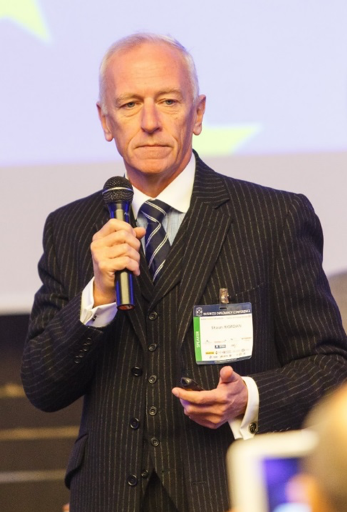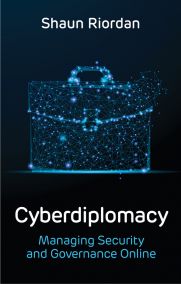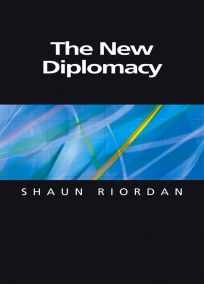CHAIR FOR DIPLOMACY AND CYBERSPACE
The Chair for Diplomacy and Cyberspace will explore the full range of current and future interactions between diplomacy and cyberspace. It will do so through the focus of the three vertices of diplomacy: agency (who – or what – is doing the diplomacy), process (the tools and techniques of diplomacy) and subject matter (the areas to which diplomacy is applied).
Agency will be explored in the sense of what kinds of human actors can count as diplomats in managing the problems of cyberspace. The increasing range of state and non-state actors participating in international debates has important implications for the practice of diplomacy. This is especially true in cyberspace, where digital tools and other technologies enhance the capacities of non-state actors. The Chair will explore the nature of these actors, how they interact with government diplomats, and whether diplomats can socialise them into the international community of diplomats, or whether they will socialise diplomats into changing their ways of acting. Agency will also explore the extent to which autonomous systems, linked to digital networks, are, or will be, able to carry out certain diplomatic functions and the implications for diplomats and statecraft. Process will explore the use of digital tools to advance broader diplomatic agendas. It will evaluate the effectiveness, or otherwise, of social media in public diplomacy. But it will look to move beyond social media to explore the more imaginative use of online platforms in pursuing diplomatic objectives, including the use online scenario building and simulations in conflict management. It will also explore the use of online games both for training diplomats and as public diplomacy tools. The Chair will promote exchanges with scientists and engineers to better understand technologies in the pipeline and their implications for diplomacy.
Subject Matter will explore the application of diplomacy to the problems arising in cyberspace. It will explore whether there is a distinctly diplomatic approach to international relations, and what value added it could bring to the problems of cyberspace, ranging from internet governance and data protection to cyber conflict, espionage and crime. An important theme will be the extent to which international law, or “rules of the game” can be developed in cyberspace to constrain the activities of both state and non-state actors. It will also explore the application of diplomacy to other areas related to cyberspace, such as machine learning and autonomous systems, especially lethal autonomous weapons systems (LAWS).
In collaboration with other Chairs, the Chair for Diplomacy and Cyberspace will research how geopolitics and strategy operate in cyberspace, and the implications for governments and other bodies (eg companies). The Chair will develop online and on site courses for diplomats and other state and non-state actors, both general and tailor-made for specific clients. It will also organise workshops and conferences, especially bringing together scientists and engineers together with diplomats and academics, and will commission and produce research, reports and books on key areas.
CÁTEDRA DE DIPLOMACIA Y CIBERESPACIO
La Cátedra de Diplomacia y Ciberespacio tiene como objetivo investigar la gama de interacciones actuales y futuras entre la diplomacia y el ciberespacio con un enfoque diplomático desde tres diferentes vértices: la autoría (quien –o qué- hace la diplomacia), el proceso (herramientas y técnicas diplomáticas) y el asunto (áreas donde interviene la diplomacia).
El estudio de la autoría se centra en los actores humanos que pueden considerarse como diplomáticos a la hora de gestionar los problemas del ciberespacio. La creciente gama de actores estatales y no estatales que participan en los debates internacionales tiene importantes implicaciones para la práctica de la diplomacia. Esto es especialmente cierto en el ciberespacio, donde las herramientas digitales y otras tecnologías incrementan las capacidades de actores no estatales. Es objetivo de la Cátedra indagar la naturaleza de estos actores y si su interacción con diplomáticos profesionales puede reorientarlos hacia la forma de actuar de aquellos. Y viceversa, hasta qué punto los sistemas autónomos, vinculados a las redes digitales, son o serán capaces de ejercer ciertas funciones diplomáticas y sus implicaciones para los diplomáticos y la política. El proceso explora el uso de las herramientas digitales con las que poder impulsar agendas diplomáticas más amplias. También se ocupa del efecto que puedan tener -o no- las redes sociales en la diplomacia pública. Incluso, más allá, estudiar la creación de escenarios virtuales y simulaciones en la gestión de conflictos, incluída la utilización de juegos para el entrenamiento de diplomáticos y como instrumentos de diplomacia pública. La Cátedra también se orienta a promover intercambios entre científicos e ingenieros para una mejor comprensión de las nuevas tecnologías y sus implicaciones para la diplomacia.
En cuanto al objeto, la Cátedra se centra en la aplicación de la diplomacia a los problemas del ciberespacio, con cuestiones como si existe un enfoque claramente diplomático de las relaciones internacionales en el ciberespacio o qué valor agregado podría aportar aquél a los problemas que éste plantea, desde la gobernanza de Internet y la protección de datos hasta el ciberconflicto, el espionaje y la delincuencia. Especial importancia tiene la consideración de en qué medida el derecho internacional y las “reglas de juego” pueden desarrollarse en el ciberespacio para restringir las actividades de los actores estatales y no estatales. Igualmente explora la aplicación de la diplomacia a otras áreas relacionadas con el ciberespacio, como el aprendizaje automático y los sistemas autónomos, especialmente los sistemas letales de armas autónomas. (SLAA).
La Cátedra de Diplomacia y Ciberespacio, en colaboración con otras, investigará cómo actúan la geopolítica y la estrategia en el ciberespacio y sus implicaciones para los gobiernos y otros organismos (por ejemplo, las empresas). La Cátedra desarrollará cursos on line y presenciales para diplomáticos y otros actores estatales y no estatales, tanto generales como personalizados para clientes específicos. También organizará talleres, seminarios y conferencias, haciendo confluir especialmente científicos e ingenieros con diplomáticos y académicos, y encargará y producirá investigaciones, informes y libros sobre áreas clave.
The Director of the Chair is Shaun Riordan

Shaun Riordan es professor visitante del Instituto Holandés de Relaciones Internacionales y tutor en el Instituto de la ONU para la Formación y la Investigación (UNITAR). Ha sido miembro del panel consultor sobre Diplomacia Pública y Digital del Fondo de las NNUU para los Objetivos del Desarrollo Sostenible (UNSDGF) y del equipo de trabajo de alto nivel para seguridad en la Organización Mundial de Turismo (UNWTO).
Shaun Riordan imparte docencia en la Escuela Diplomática de Madrid y en las Academias Diplomáticas de la República Dominicana, Armenia y Bulgaria. Ha servido durante 16 años en el Servicio Diplomático Británico con puestos en Nueva York, Taipei, Beijing y Madrid y ha trabajado en el Departamento de Contra-Terrorismo y Yugoslavia en el Servicio Exterior. Es autor autor de The New Diplomacy (2003), Adios a la Diplomacia (2005) and Cyberdiplomacy: Managing Security and Governance On-line (2019) así como de numerosos artículos y capítulos en publicaciones sobre innovación en diplomacia y geopolítica.
……………………………………………
Shaun Riordan is a senior visiting fellow of the Netherlands Institute for International Relations and an advisor to UNITAR on Public and Digital Diplomacy. He has been a member of the advisory panel on public diplomacy for the UN SDGF and a member of the High-Level Task Force for Security of the UNWTO.
Shaun teaches at the Diplomatic Academy in Spain as well as at diplomatic academies in the Dominican Republic, Armenia and Bulgaria. He served for 16 years in the British Diplomatic Service, with postings to New York, Taipei, Beijing and Madrid, as well as working in the Departments of Counter-Terrorism and Yugoslavia in the Foreign Office. He is the author of The New Diplomacy (2003), Adios a la Diplomacia (2005) and Cyberdiplomacy: Managing Security and Governance On-line (2019) and numerous articles and chapters in edited editions on innovation in diplomacy and geopolitics.
Volume 3 (2018): Issue 3 (Jun 2018): The Geopolitics of Cyberspace: a Diplomatic Perspective




